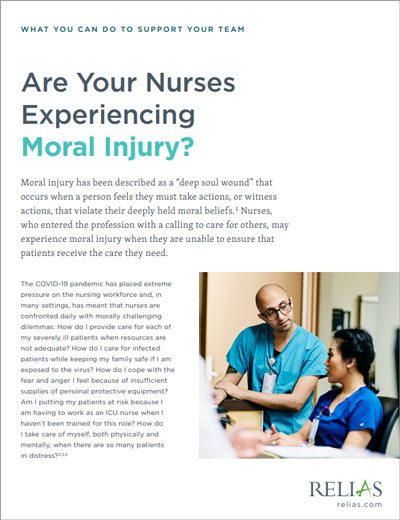As the healthcare industry evolves and adapts to changes in care delivery, technology, and patient needs, the challenges for healthcare workers also shift.
As caregivers navigate healthcare’s everchanging policies and procedures in an already high-stress environment, correctly recognizing their challenges and struggles is often difficult, yet extremely important. While we’ve long understood the physical toll a 12-hour shift can have on healthcare workers, understanding emotional impacts and their effects on healthcare workers has been less appreciated.
What had been frequently confused as burnout has only recently been more accurately identified as moral injury — a relatively new term in healthcare. Burnout, an occupational phenomenon (not a medical condition), results from chronic workplace stress, is characterized by feelings of exhaustion, increased mental distancing from one’s work or cynicism about work, and reduced professional efficacy.
Moral injury, however, has been described as a deep soul wound that occurs when a person feels they must take actions, or witness actions, that violate their deeply held moral beliefs. The term describes the challenges of simultaneously knowing what care patients need, but being unable to provide it due to constraints beyond a caregiver’s control.
Seeing Moral Injury for What It Is
Caregivers enter the healthcare industry with a calling to care for others. Being unable to ensure that patients receive the care they need creates a moral conflict. They may feel a distressing disconnection between the values that led them into their profession in the first place and the compromises they must make from day to day. This is only exacerbated as financial and regulatory imperatives and inadequate care models shift focus away from the vital patient-clinician relationship.
Feelings associated with moral injury might include:
- Shame
- Inadequacy
- Distress
- Self-blame
- Withdrawal
- Guilt
- Anxiety
- Anger
- Remorse
Moral Injury vs. Burnout During a Pandemic
Understanding the difference between burnout and moral injury is important, as using different terminology reframes the problem and the solutions. Burnout is characterized by symptoms of emotional exhaustion, depersonalization, and reduced personal accomplishment and has been discussed in the healthcare industry for many years.
However, moral injury differs significantly and is becoming more prevalent in healthcare workers during the COVID-19 pandemic.
While moral injury is not a new issue in healthcare, the COVID-19 pandemic has increased challenges for caregivers, as they are unable to care for patients as they traditionally had. These new pressures have forced caregivers to confront morally challenging dilemmas. Consider these examples:
- Increased personal protective equipment (PPE) creates an alarming sense of fear in patients, when helping them to remain calm is of the utmost importance.
- Heightened restrictions prevent caregivers from comforting patients through physical touch such as hand holding or even wiping away tears or sweat.
- Additional equipment such as fans and ventilators make it difficult for caregivers to be heard as they try to offer kind words of comfort to patients.
- New protocols limit patients’ visitors, leaving caregivers to communicate at an increased amount with patients’ families — often delivering unfortunate updates on their status.
- Shortage in equipment has forced caregivers in many situations to reuse PPE as a last resort, despite the increased risk of infection associated with doing so (to both themselves and to patients).
- Dire need for additional ventilators leaves caregivers to decide which patients will use them and which ones will not.
- Overcrowded facilities have been faced with the heart wrenching decision to turn patients away based on the predicted survivability rate.
Effects of Moral Injury on Healthcare Workers
Intense feelings of moral injury can contribute to the development of mental health challenges, and the accumulating effect of moral injuries over time can have long-lasting effects on one’s sense of self. Common effects of moral injury on caregivers might include:
- Negative changes in behavior (both significant and ongoing)
- Loss of motivation
- Weakened sense of empathy or compassion
- Compulsive behavior
- Changes in sleep
- Isolation
Additionally, when caregivers find themselves in situations where they feel they cannot live up to their own values, or where their teams are not meeting high standards of care, they can experience distrust of colleagues or of the leaders of their organization.
Career Impacts from Moral Injury
In a recent Nurse Salary Research Report, 11% of respondents reported actively looking to change employers, with 38% passively looking as well. Of those seeking new employers, 34% believe they will change within the next two to three years.
The leading response for leaving a profession was “too stressful, low job satisfaction,” while coming in second was “pandemic, disregard from employer for safety.”
As the novel coronavirus will forever change the healthcare landscape in ways leaders cannot fully predict and plan for, providing support for healthcare workers will always remain a leading priority. Organizations and individuals alike can (and should) make a conscious effort to help promote understanding and change the conversation around moral injury as critical first steps to addressing this growing challenge.

Are Your Nurses Experiencing Moral Injury?
Download this white paper to learn about seven ways to address moral injury with your team by building connections, including ways to both empower and protect your team members and to enhance both interpersonal and inter-organizational communication.
DOWNLOAD THE WHITE PAPER →





